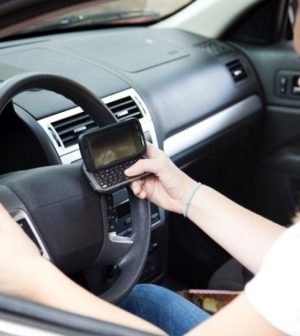- Could Your Grocery Store Meat Be Causing Recurring UTIs?
- Are You Making This Expensive Thermostat Error This Winter?
- Recognizing the Signs of Hypothyroidism
- 10 Strategies to Overcome Insomnia
- Could Artificial Sweeteners Be Aging the Brain Faster?
- Techniques for Soothing Your Nervous System
- Does the Water in Your House Smell Funny? Here’s Why
- Can a Daily Dose of Apple Cider Vinegar Actually Aid Weight Loss?
- 6 Health Beverages That Can Actually Spike Your Blood Sugar
- Treatment Options for Social Anxiety Disorder
Teens with Anxiety, Mood Disorders Less Likely to Get Driver’s License

Teenagers suffering from anxiety, depression or bipolar disorder are likely to have a tougher time getting their driver’s license, a new study finds.
Teens and young adults with these types of mood disorders are 30% less likely to obtain a driver’s license than peers without a mood disorder, researchers report April 8 in the journal JAMA Network Open.
Youths with mood disorders also have nearly twice the risk of losing their license and a slightly elevated risk of crashing a vehicle, the researchers discovered.
“Our results indicate that newly licensed youths with mood disorders have a greater risk of crashing than other young drivers, but that this is a manageable risk,” said senior researcher Allison Curry, an associate professor of pediatrics with the Children’s Hospital of Philadelphia (CHOP) Center for Injury Research and Prevention.
As many as one in 10 teens and young adults have been diagnosed with a mood disorder, researchers said in background notes.
These disorders often develop around the age a teen becomes eligible to get a driver’s license, researchers noted. However, skills required for safe driving — attention, memory, motor skills — are often impaired in those with mood disorders.
For the study, researchers compared nearly 1,900 teens with mood disorders to more than 84,000 teens without such a disorder, all of whom were eligible to get their license.
They linked the teens’ electronic health data with New Jersey driver licensing and crash data, to see how a mood disorder might affect driving.
They found that teens with mood disorders were significantly less likely to get a license.
“Obtaining a driver’s license is an exciting milestone for many teens and young adults, but our study found that youths with mood disorders are 30% less likely to acquire a driver’s license than their peers without mood disorders,” said lead researcher Dr. Christopher Gaw, a pediatric emergency medicine doctor at Nationwide Children’s Hospital in Columbus, Ohio. He conducted the study while at CHOP.
They also found a 16% increased risk of crashes within a year of getting their license, and a 19% increased risk within four years.
Meanwhile, young drivers with mood disorders had nearly double the rate of license suspensions and were also more likely to be involved in alcohol-related crashes and moving violations.
“Our findings point to the need to develop evidence-based training and education for adolescents and young adults with mood disorders who want to drive,” Curry said in a CHOPS news release.
More information
The National Highway Traffic Safety Administration has more on teen driving.
SOURCE: Children’s Hospital of Philadelphia, news release, April 8, 2024
Source: HealthDay
Copyright © 2026 HealthDay. All rights reserved.










